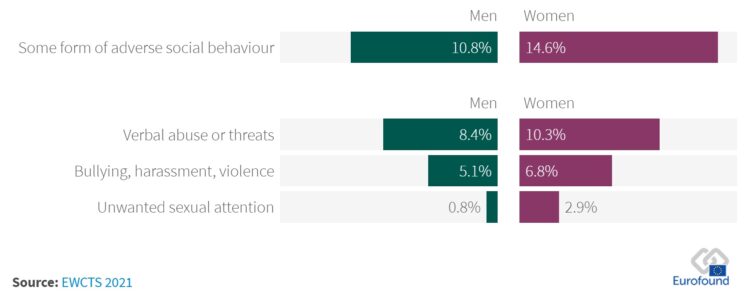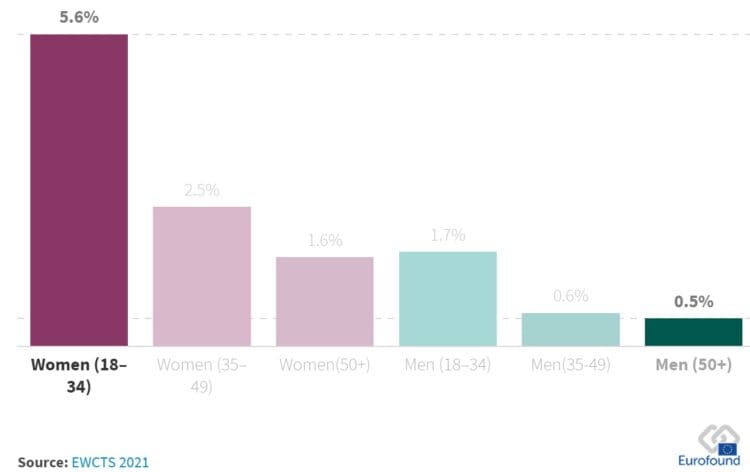Women and frontline workers in Europe are those most exposed to the risks of adverse social behaviour at work. This includes bullying, harassment, violence, verbal abuse or threats and unwanted sexual attention. Generically, such ‘violence in the workplace’ can have significant impacts on health—mental (burnout, exhaustion, anxiety and depression) as well as physical.
Eurofound’s European Working Conditions Telephone Survey 2021 examined the prevalence of adverse social behaviour in the workplace and its health and wellbeing implications for those on the receiving end. The EWCTS is a high-quality, probability-based survey which presents the experiences of more than 70,000 workers in 36 countries.
Gender gap
The survey found that, on average, 12.5 per cent of workers in the European Union experienced some form of adverse social behaviour at work in 2021. The proportion of women enduring it was however consistently higher than for men (Figure 1).
Figure 1: proportion reporting different forms of adverse social behaviour in the workplace (EU27)

While this is the case for all forms of adverse social behaviour covered, the gender gap is particularly striking when it comes to unwanted sexual attention (Figure 2). Women are 3.6 times as likely to suffer from this as men.
Indeed the likelihood of a young woman (18-34 years) reporting unwanted sexual attention is over three times as high as for men of the same age and 11 times as high as for the oldest group of men (50+ years). There is also an age differential among women, with the young cohort 3.5 times as likely to report unwanted sexual attention as their 50+ sisters.
Figure 2: proportion reporting unwanted sexual attention in the workplace (EU27)

Frontline workers
Those who deal with customers are twice as likely to experience adverse social behaviour at work as those who do not. But the situation is particularly acute for frontline workers.
Healthcare workers reported an incidence of unwanted sexual attention over three times the EU average (5.7 per cent compared with 1.7 per cent), while just 0.3 per cent of information-and-communication professionals did so. Healthcare and protective-services workers (including firefighters, police officers, prison and security guards) reported bullying, harassment and violence at two to three times the EU average. A variety of frontline workers reported verbal abuse or threats, again some as high as two and a half times the EU average.
There is a clear link between adverse social behaviour and the share of workers reporting negative mental and physical health outcomes (‘psychosocial risks’). Victims are over three times as likely to experience physical and emotional burnout (32 per cent compared with 10 per cent) and emotional exhaustion (40 against 14 per cent), and almost twice as likely to suffer from anxiety (53 against 27 per cent) or be at risk of depression (38 against 20 per cent).
Significant risk
Adverse social behaviour at work poses a significant risk to workers’ health and wellbeing. The EWCTS reveals that women and frontline workers are most at risk, given their higher-than-average exposure to bullying, harassment, violence, verbal abuse or threats and unwanted sexual attention.
The impact can be long-term on individuals—effects can linger for years after the initial incident(s)—and may also ripple out into their families, co-workers, employers and wider social circles. Many victims do not see good job prospects in the near future and nearly a third say they do not get the support they need from management.
When it comes to public policy, prevention as well as protection—including supporting victims—is key. While there are a range of policy initiatives at EU, national, sectoral and company levels, improving job quality is imperative.


